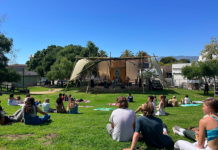UCSB Housing and Residential Services and the Resident Hall Association (RHA) are discussing a proposal to restrict the use of table tent advertisements to Housing and Residential Services only, following the rejection and subsequent approval of an advertisement for Scientific Understanding and Reason Enrichment (SURE).
The proposal to change the policy comes after SURE told Dining Services they could go to court over the rejection claiming it was a violation of free speech. Dining Services later approved the ad and intends to place an up-to-date version in the new year.
The advertisement featured information about the club, which promotes secularism, next to an image of Adam from the Sistine Chapel ceiling, and promoted a Nov. 12 lecture by Dan Barker, an evangelical preacher turned atheist. Table tents, the three-sided, standing paper advertisements placed on tables in the dining commons, must be approved by the RHA president and Dining Services in order to be placed.
Tyler Santander, Director of Public Outreach for SURE, said the club was at first informed its advertisement would be placed, but that Dining Services told him the approval had been overruled, claiming the ad was “controversial and potentially upsetting.”
“UCSB is a 100 percent free speech zone,” said Santander. “You can say anything, advertise anything, and no one can do anything about it, so turning something down on the basis of being, controversial and possibly upsetting, defies free speech.”
The Director of Residential Dining Services could not be reached for comment, but Director of Housing and Residential Services Willie Brown offered an explanation for why the ad was initially rejected.
“I think our staff was following the generally accepted social norm of not promoting the discussion of politics or religion while dining,” he said. “The Dining Commons are an extension of our residents, living area and we want students to have a relaxing experience while eating. SURE was offered the alternative of leaving flyers at the residence hall front desks.”
Brown also said the idea of changing the table tent policy is not new.
“Our Dining Services administration has considered changing the policy for some time now due to the logistics, labor, and time needed to distribute the table tents to four Dining Commons,” he said. “One of our department values is “being environmentally sensitive.” The amount of paper being used to make the table tents has always been a concern of ours from a sustainability standpoint.”
Joseph Navarro, Associate Dean of Students and SURE adviser, examined the Dining Services’ table tent policy and determined that the ad rejection infringed on the group’s right to free speech.
“The policy didn’t specify any guidelines by which outside groups would have their table tents approved,” he said. “There was only the administrative practice that table tents would be rejected if they were political, religious, or controversial. Rejection based on content is, I believe, unconstitutional.”
Santander said he does not believe SURE was discriminated against, and hopes the situation can be worked out.
“I won’t jump so far as to say it was intentional discrimination and [Dining Services] does not want to see secularism in the Dining Commons,” he said. “I suppose to some people [the ad] could be offensive, but it could always just be a misunderstanding of secularism.”
Santander said if the table tents are not placed, SURE is prepared to go to court.
“People might say, ‘Why are you making such a big deal about table tents?” but it’s the principle of it,” he said. “Anytime constitutional rights are threatened, it’s important to fight no matter how small the issue.”
RHA President Charlie Arreola did not wish to comment on the matter until an agreement on the policy has been reached.
















